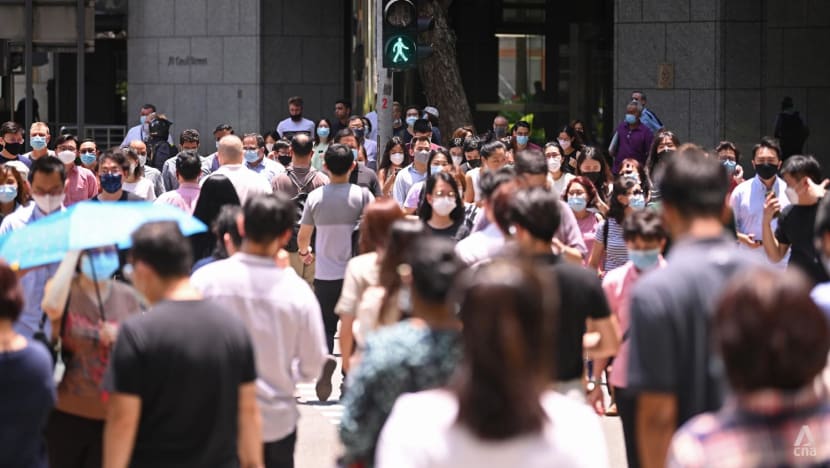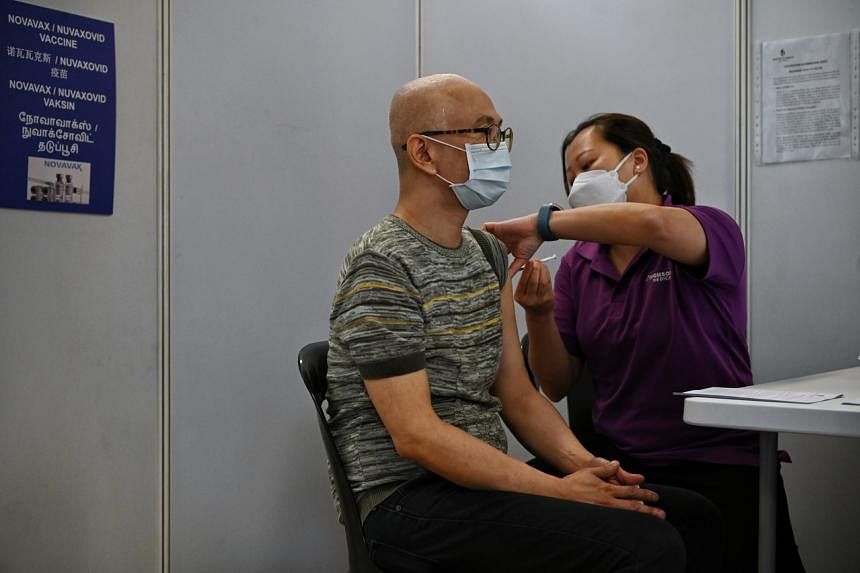www.channelnewsasia.com
Singapore
 People wearing masks in the central business district in Singapore on Mar 25, 2022. (Photo: CNA/Gaya Chandramohan)
People wearing masks in the central business district in Singapore on Mar 25, 2022. (Photo: CNA/Gaya Chandramohan)
28 Jun 2022 09:27PM (Updated: 28 Jun 2022 10:59PM)
SINGAPORE: Singapore reported 11,504 new COVID-19 cases as of noon on Tuesday (Jun 28), comprising 10,732 local infections and 772 imported cases.
There was one fatality, taking the death toll from coronavirus complications to 1,410.
Cases tend to increase on Tuesdays, with Health Minister Ong Ye Kung previously referring to such a pattern, writing on Facebook in October 2021 that numbers would "always spike after the weekends".
The last time Singapore reported more daily infections than Tuesday was on Mar 22, when 13,166 COVID-19 new cases were reported.
A total of 437 patients are in hospital, according to the latest infection statistics on the Ministry of Health's (MOH) website on Tuesday night. Thirty-six patients require oxygen supplementation.
Nine patients are in the intensive care unit.
On Monday, MOH said about 45 per cent of COVID-19 cases in the community in the past week were those of the BA.4 and BA.5 subvariants, up from 30 per cent in the week before.
The BA.5 subvariant alone is estimated to have contributed to 40 per cent of all COVID-19 cases in the past week.
However, international and local data show that the two subvariants do not result in more severe outcomes as compared to the earlier Omicron strains, said MOH on Monday.
"Coupled with our population’s high vaccination coverage, the number of severe COVID-19 infections has remained manageable," said the Health Ministry.
Deputy Prime Minister Lawrence Wong, who is also co-chair of the COVID-19 multi-ministry task force, said on Monday that there was no need to tighten COVID-19 safe management measures at this stage, but adjustments will be made "if need be".
He said cases are expected to continue rising in the coming weeks, although the hospital situation remained stable.
Among the local cases reported on Tuesday, 9,989 cases are tested using antigen rapid tests (ARTs) and have been assessed by doctors to have mild symptoms and are of low risk, said MOH.
The remaining 743 local COVID-19 cases were confirmed via polymerase chain reaction (PCR) tests.
Of the imported cases, 748 were tested using ARTs and 24 using PCR tests.
The week-on-week infection ratio is 1.62. A number above 1 indicates that the number of new weekly COVID-19 cases is rising. The week-on-week infection ratio has been above 1 since Jun 14.
Singapore has recorded 1,425,171 COVID-19 cases since the start of the pandemic.
The Health Ministry will be conducting a third national distribution of 10 ART kits to each residential household from Jul 18 via post.
As of Monday, 96 per cent of Singapore's eligible population have completed their full vaccination regimen under the national vaccination programme.
About 78 per cent of the total population have received their vaccine booster shots.
People aged 50 and above who want to get their second booster shot can do so by walking into any vaccination centre offering mRNA vaccines. The mRNA vaccines used in Singapore are Pfizer-BioNTech's Comirnaty vaccine and Moderna's Spikevax vaccine.
The expert committee on COVID-19 vaccination has assessed that people aged 50 to 59 who wish to take their second booster may also do so about five months after their first booster shot.
“This is in view of data indicating that the risk of severe COVID-19 increases in the age group of 50 to 59 as well,” said MOH. "This is also around the age when chronic diseases start to set in."
There are currently 10 Joint Testing and Vaccination Centres, and eight vaccination centres. Last week, MOH said that mobile vaccination teams will be deployed to help seniors get boosted.
Singapore
Singapore reports 11,504 new COVID-19 cases, highest daily number of infections in more than 3 months

28 Jun 2022 09:27PM (Updated: 28 Jun 2022 10:59PM)
SINGAPORE: Singapore reported 11,504 new COVID-19 cases as of noon on Tuesday (Jun 28), comprising 10,732 local infections and 772 imported cases.
There was one fatality, taking the death toll from coronavirus complications to 1,410.
Cases tend to increase on Tuesdays, with Health Minister Ong Ye Kung previously referring to such a pattern, writing on Facebook in October 2021 that numbers would "always spike after the weekends".
The last time Singapore reported more daily infections than Tuesday was on Mar 22, when 13,166 COVID-19 new cases were reported.
A total of 437 patients are in hospital, according to the latest infection statistics on the Ministry of Health's (MOH) website on Tuesday night. Thirty-six patients require oxygen supplementation.
Nine patients are in the intensive care unit.
On Monday, MOH said about 45 per cent of COVID-19 cases in the community in the past week were those of the BA.4 and BA.5 subvariants, up from 30 per cent in the week before.
The BA.5 subvariant alone is estimated to have contributed to 40 per cent of all COVID-19 cases in the past week.
However, international and local data show that the two subvariants do not result in more severe outcomes as compared to the earlier Omicron strains, said MOH on Monday.
"Coupled with our population’s high vaccination coverage, the number of severe COVID-19 infections has remained manageable," said the Health Ministry.
Deputy Prime Minister Lawrence Wong, who is also co-chair of the COVID-19 multi-ministry task force, said on Monday that there was no need to tighten COVID-19 safe management measures at this stage, but adjustments will be made "if need be".
He said cases are expected to continue rising in the coming weeks, although the hospital situation remained stable.
Earlier this month, Mr Ong said that Singapore could expect a new Omicron wave to emerge in July or August, as COVID-19 antibodies start to wane.Among the local cases reported on Tuesday, 9,989 cases are tested using antigen rapid tests (ARTs) and have been assessed by doctors to have mild symptoms and are of low risk, said MOH.
The remaining 743 local COVID-19 cases were confirmed via polymerase chain reaction (PCR) tests.
Of the imported cases, 748 were tested using ARTs and 24 using PCR tests.
The week-on-week infection ratio is 1.62. A number above 1 indicates that the number of new weekly COVID-19 cases is rising. The week-on-week infection ratio has been above 1 since Jun 14.
Singapore has recorded 1,425,171 COVID-19 cases since the start of the pandemic.
The Health Ministry will be conducting a third national distribution of 10 ART kits to each residential household from Jul 18 via post.
As of Monday, 96 per cent of Singapore's eligible population have completed their full vaccination regimen under the national vaccination programme.
About 78 per cent of the total population have received their vaccine booster shots.
People aged 50 and above who want to get their second booster shot can do so by walking into any vaccination centre offering mRNA vaccines. The mRNA vaccines used in Singapore are Pfizer-BioNTech's Comirnaty vaccine and Moderna's Spikevax vaccine.
The expert committee on COVID-19 vaccination has assessed that people aged 50 to 59 who wish to take their second booster may also do so about five months after their first booster shot.
“This is in view of data indicating that the risk of severe COVID-19 increases in the age group of 50 to 59 as well,” said MOH. "This is also around the age when chronic diseases start to set in."
There are currently 10 Joint Testing and Vaccination Centres, and eight vaccination centres. Last week, MOH said that mobile vaccination teams will be deployed to help seniors get boosted.







